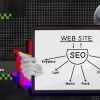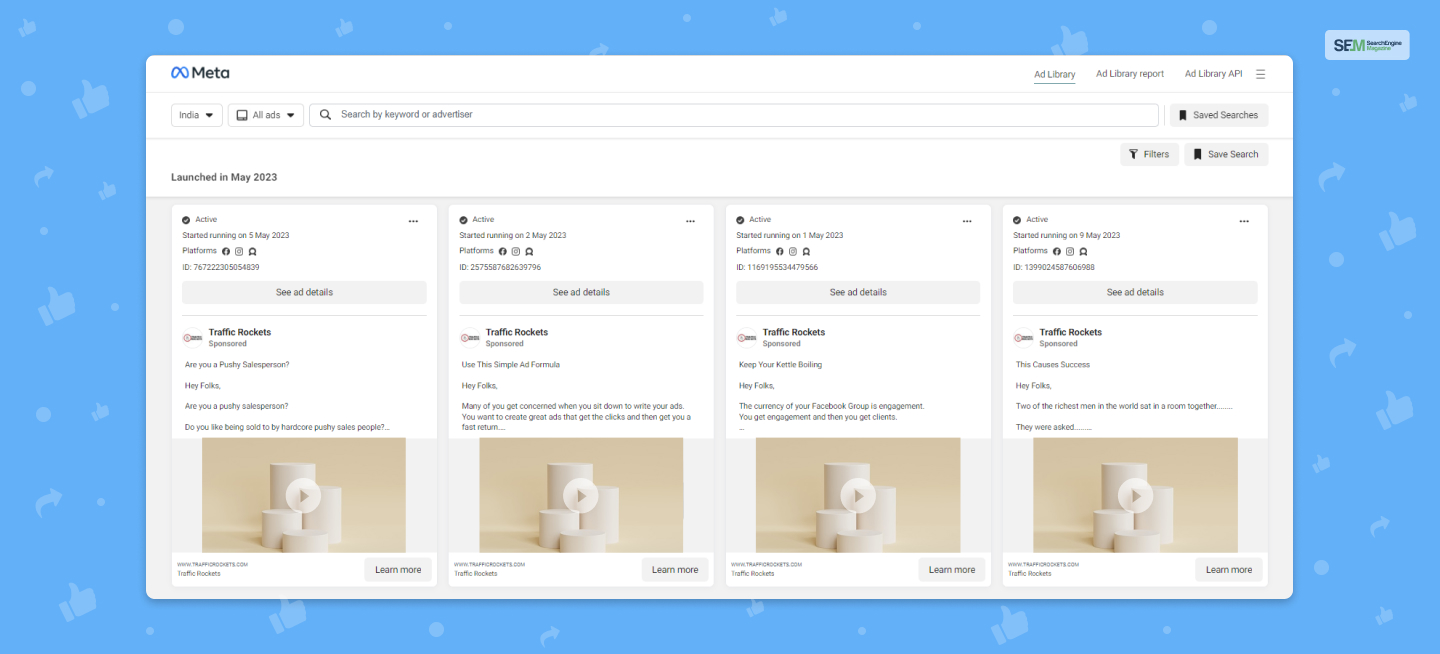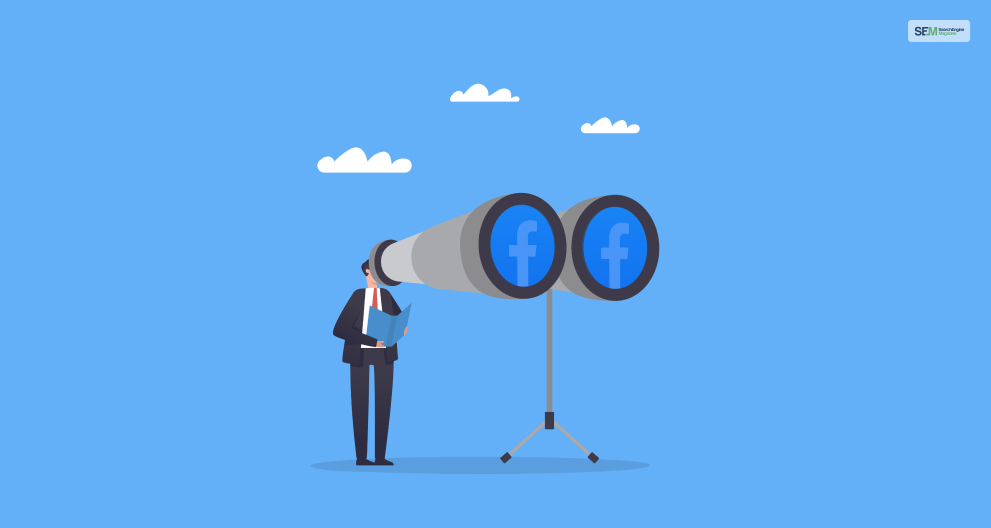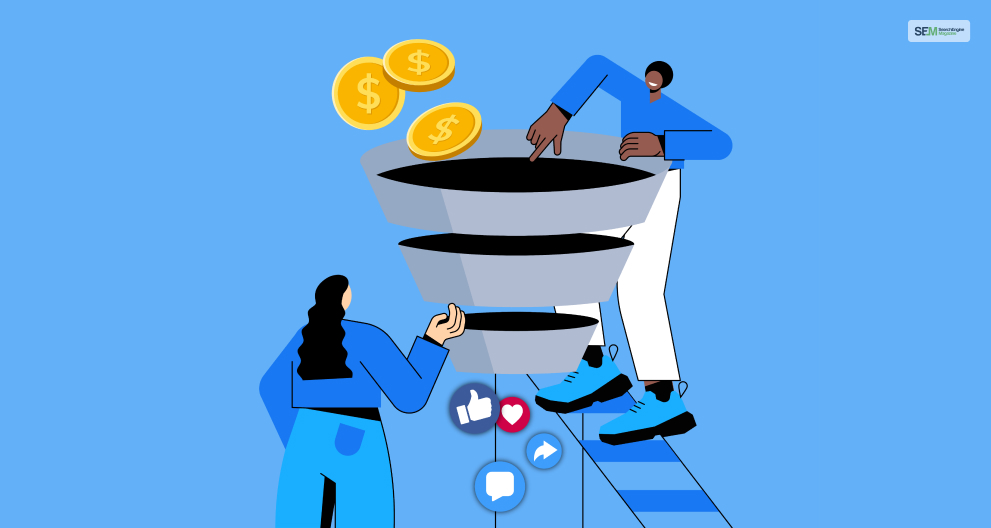5 Best CMS For SEO: Which One Optimizes Content Management?
Feb 11, 2026

Feb 11, 2026

Feb 11, 2026

Feb 10, 2026

Feb 09, 2026

Feb 07, 2026

Feb 06, 2026

Feb 06, 2026

Feb 05, 2026
Sorry, but nothing matched your search "". Please try again with some different keywords.


Every active ad on Facebook is listed in the searchable Facebook Ad Library. The library details the ad’s creator, publication date, and supporting creative. Any Facebook ad that has been published will be visible in the ad library for up to 7 years.
The ad library, however, allows users to learn more about what Facebook is doing. The library was first established in an effort to increase openness following the Facebook political ad incident in 2016.
The Facebook Ads Library is a treasure trove of knowledge for advertisers. You may use it to keep tabs on your progress over time, discover what your rivals are up to, and obtain inspiration for your own marketing initiatives.
However, its most important use in 2023 is to optimize your Facebook Ads. Read this post until the end to learn how to use the FB Ad Library.
You can optimize your ads using the Facebook Ad Library by following these successful, tried, and tested techniques:

In the business world, doing something unique to separate yourself from competitors is the only way to beat them. To do so, you must start using the Facebook Ad Library.
Using this fantastic Ad Library, you can check out the ads of competing businesses and try to understand their strategies. You can look at their ads, keywords, design choices, ad optimization techniques, and more!
However, while doing a competitive analysis, don’t just check out the ads of your main competitors. Instead, analyze the ads of all the industry leaders and see what ad strategies and techniques they have in common.

Sometimes, big brands might rehash the same ad – slightly altered – to gain more conversions and better ad views. But why do they use the same ad? Is “not changing what is not broken” a core philosophy in ad optimization?
The answer is not that simple. Big brands are constantly improving their ad budget and strategies to improve performance. Therefore, they often use previously used ads – with only a few changes. These changes made are done to see which elements work better for different ads and what don’t.
Therefore, learning these differences is crucial if you are doing a competitor’s ad analysis. The Facebook Ad Library allows you to do this using their A/B split testing feature. This testing tool will highlight the key differences if you see two similar ads. It also shows how much of an impact these changes have.
With A/B testing, you can spot minor differences like changes in images used, a different CTA (call to action), different headings and fonts, and more. Sometimes, it’s these small changes that make all the difference in the minds of customers.

You can browse a nigh-infinite number of Facebook ads using the Facebook Ad Library. Therefore, you will see various similarities in your competitors’ ads as you become accustomed to this tool.
These similarities could be limited to the hue of the pictures, the overall color combinations and the types of fonts and iconography used. Once you notice these similarities in the highest-performing ads, you will learn what makes them perform.
Like new products and songs, even ads have different types and design choices that are trending. For example, you use various kinds of ads on Facebook, like video ads, image ads, carousel ads, and slideshows. If you see that the frequency of one of these ads appears more than others, you will understand which ad type is trending now.
In addition, Facebook Library Ads also provide various metrics and information related to such advertisements. Here, you can check how long an ad has been active. Plus, you can see how many impressions and conversions it has generated so far.
If an ad has been in circulation for a long time and still receives a healthy amount of impressions and conversions, it has trendy elements that have kept it afloat. Therefore, learn what they are and try to use them in your Facebook Ads to optimize them and gain better results!
You can also develop a unique idea that separates you from the trend-following herd and create something the audience likes!

You heard the phrase “seize the opportunity when it comes.” The same is true for ads as well. In the world of social media, seizing the opportunity to launch an ad for the best results should be highly regarded. Therefore, all marketing experts should start paying more attention to finding the correct time cues for launching an ad.
Sometimes, your ad is premature. You could risk launching it too early and potentially alienating the audience when the timing is right. On the other hand, you could risk throwing the ad a bit too late and not excite audiences anymore.
The timing of your ads becomes more critical if you prepare for events and festivities. For example, if the brand you are marketing provides an offer on its products for Christmas, then you should launch this ad a week before Christmas, keeping it in circulation until the end of the offer. Timing this ad before will lead to higher costs with diminished returns, while launching it after the offer ends is pointless.

The marketing funnel refers to a customer’s digital journey to buy a product. For example, a simple funnel might have the customer follow these steps:
As you can see from the simple example above, the customer is led to a user-friendly process of purchasing a product. Since this is a part of marketing and ad optimization, you can look at the marketing funnel of customers and set a better marketing funnel for your brand, made better by an optimized one!
Remember that the advertisements examine the last stage of their and your Facebook ad plan.
Only the ad creatives of other people are visible to us; we are not privy to or aware of their audience targeting context, audience network, or ad expenditure. The creative concepts of a campaign merit investigation even without the targeted data.
While many marketers see the Facebook Ad Library as an opportunity, some see this much transparency as a danger. When they’re in an advertising rut, need a little boost for their next Facebook ad campaigns, or just want to step up their marketing game and improve advertising CTR, smart marketers view it as an open door to creative ideas.
More Resources:
Mashum Mollah is the feature writer of SEM and an SEO Analyst at iDream Agency. Over the last 3 years, He has successfully developed and implemented online marketing, SEO, and conversion campaigns for 50+ businesses of all sizes. He is the co-founder of SMM.
View all Posts
